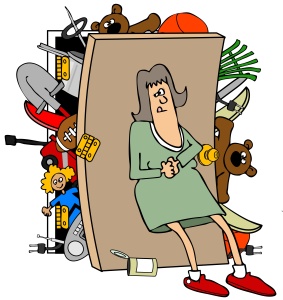 Furious and Fuming | What Really Makes You Angry
Furious and Fuming | What Really Makes You Angry
In our previous blog, we looked at your relationship with anger and different ways you may get angry. And while we touched on the physiological flight or fight response to anger in that blog, let’s see if we can dig deeper into the biology of anger and what really makes you angry.
When we are angry it is sometimes hard to believe that anger is actually a secondary emotion. Not secondary in terms of less important, but rather secondary in terms that another emotion is felt first and anger is the second emotion.
The idea of anger is like an iceberg. The anger is the eruption that is seen. What lies beneath are the originating emotions. And these are what really matter.
The originating emotions are the emotions that are so painful, vulnerable and uncomfortable that we quickly make the shift to anger. These are the boogeymen in the closet you don’t want to face.
When an event happens that affects us negatively we may feel such emotions as hurt, helplessness, shame, rejection, and the big one – fear. These emotions are very difficult to experience – so we shut the door of the closet very quickly.
 Our internal system will do anything to avoid feeling these difficult emotions and will quickly move us into a state of regaining power. The answer as to why we slam that door and become angry instead is quite simple: Anger feels powerful. It feels like a way to right the wrong, and take away the feeling of vulnerability that comes with being out of control.
Our internal system will do anything to avoid feeling these difficult emotions and will quickly move us into a state of regaining power. The answer as to why we slam that door and become angry instead is quite simple: Anger feels powerful. It feels like a way to right the wrong, and take away the feeling of vulnerability that comes with being out of control.
In order to regain power and avoid the state of vulnerability prompted by the originating event the brain goes into high gear. In an oversimplified biology lesson – this state of mind is governed by our brain and small almond shaped structures known as the amygdala that governs our fight or flight response. (Digging deeper than the last blog here!)
When the amygdala interprets a danger, it sends the signal to other brain structures (the hypothalamus) to begin the cascade of hormones that provide a surge of power in preparation for the fight (Adrenaline, Cortisol, Norepinephrine- the three major stress hormones).
Anger temporarily takes us away from feeling hurt, helplessness, ashamed, rejected, and the big one – afraid. Instead our body feels powerful. No wonder anger can be addictive to people since it can numb the pain and convert to a sense of power.
Why would anyone want to find an antidote to that?
Get Happy! Establish your sense of well-being with my FREE 7-day Guided Meditations:
Why you need to manage your anger
Chronic anger can be toxic to relationships and to health. Although the emotion of anger is a normal human emotion, neither good nor bad, it’s important to differentiate that there is a difference between anger the emotion and aggression the behavior.
When the fight or flight response is activated and the hormones prepare for the fight our frontal cortex (our rational brain) disengages. We stop functioning rationally and sensibly, which is why it is so difficult to slow the process down.
One “old fashioned technique” is to slowly count to ten. Focusing on the counting allows your rational mind catch up with your feelings. Deep diaphragmatic breathing can help to regulate the hormones because it helps to quiet down the amygdala.
Once the experience of anger has been short circuited it becomes important to become honest with the iceberg of emotions and understand what the originating emotions are so that we can address these emotion directly.
In other words, now that you know what anger is, and you know how to manage your anger, it’s time for you to assess what really makes you angry?
You see that you are quite clear on how you get angry from our last blog, right? And you see that you may act aggressively when you’re angry, creating more of a problem for yourself. However, what is that boogeyman in the closet? What is really making you angry?
It’s time for you to look at the iceberg under the water. You need to take a minute to say, “What is really triggering my amygdala to fight or flight?” When you take the time to look deeper into yourself, you may be able to start resolving how you feel about the real boogeyman.
Instead of punching him in the face, perhaps you can learn to invite him out into the room for a cup of tea and cookies. You can look him in the face and ask why he’s so insecure about something that hurts him.
By making peace with the primary cause of your anger, you will slowly learn to stop slamming the door and acting aggressively towards it. You will also find a deeper sense of inner contentment as you no longer need to cover over your fear, do you?
Dr. Ines K. Roe has been helping women in transition rediscover themselves for over 20 years. If you’ve been feeling unfulfilled, are frustrated with your sense of accomplishment in midlife, or simply need guidance on your path to holistic well being, join her ecourse.


This is a distinction I’d never consciously considered and provides much food for thought.
Another informative post that is important for everyone to read. Thanks once again.
Things anger me often but I never really considered myself an angry person. Definitely not one with an anger problem. Sometimes I worry THAT is a problem, the not getting too horribly upset with folks and situations, even when it’s deserved. You’ve got me thinking, my friend.
Such an important topic! I was just talking to someone close to me this morning about this very thing. Thank you for sharing.
I haven’t “kicked” the anger thing, but I have learned that removing myself from the situation often calms me down (kind of like counting to 10, but not). I will admit that I have a short fuse, but it used to be shorter. So, that’s progress, right?
Thank you for helping me see anger in a totally new way.
Great information, and so helpful in a conversation with my daughter this afternoon. Thank you!
So much wonderful information, I will be passing this post along!
So much good information here because anger can be so dangerous. You’re right that it’s important to deal with the underlying emotions behind it – but that’s so much more challenging than just slamming a door.
Interesting information and it makes so much sense. Thanks for enlightening us!
I love the reference to the “iceberg under the surface”. That is perfect.
Great insights. Wonderful suggestions! Thank you!
Very interesting. I do think anger, when channeled properly, can move people to take action. Injustice, as an example, when observed and felt at a visceral level by an individual, often drives the observer to work to correct the injustice. In those cases I feel anger is healthy.
As always I enjoy learning from you and appreciate your blog immensely!
Great thoughts and tips. I can see that happening now when you describe it. Life is too short to be angry.
I agree. Anger stems from underlying causes and we need to address those issues so that we can truly let it go and move into a healthier, happier place within ourselves. Anger never brings positive possibilities in our lives and the longer we hold onto this anger the bigger it grows. Great tips and advice.
Thanks for posting this today. I had never considered the fact that there are underlying emotions behind anger. In now famous words, “Let it go!”
We used to think its a good thing to let anger out so it doesn’t build up. Really nice approach to understanding anger.
I’ve always felt, that if you feel angry prefer to do something else, for example go jogging or hit a pillow. Prefer to scream against a tree or a car than against another person. You can also talk to someone you trust.
It is important to retain and learn to express and manage your anger safely. Otherwise may harm someone else or yourself.
Great post!
Thanks for uncovering this distinction about identifying the true underlying emotion that often flips us into anger as a way not to have to confront what we are really dealing with. Anger is so toxic and destructive and once we can stop and be objective about where it is coming from , we have the opportunity to transform it. I imagine that most people believe they are feeling anger when it is actually something totally different. Life does offer us so many opportunities to learn and grow and I enjoyed this post, as it offered constructive ways to empower and transform yourself. Thanks Ines.
I’ve often thought that anger is a useless and counterproductive emotion.
I had not thought about anger as a coverup of the underlying emotion or as a powerful emotion. Yes, it is both now that you mentioned it. It gives me a new perspective about anger management.
Anger is a natural response to injustice and being wronged, but what we do with the anger is what makes the difference. there is such a thing as holy anger. I get angry over things like abuse of women and children, and violence to helpless people, and injustice in this world….but I get down on my knees and pray for change, and go out and vote for change.
Thanks, Ines, for your well-explained article, “Furious and Fuming: What Really Makes You Angry?’ Indeed, we need to find out what are the originating emotions which lead to anger and how to manage it accordingly.
Thank you Ines for this very informative post! I was unaware that anger is a cover up of an underlying emotion. Now that I sit back and think about it I understand in my situations when I am angry what it really means now! With a better understand with the help of your post I will be able to manage my anger in a very different way! Thanks for Sharing!